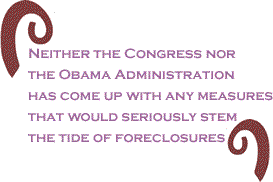Noting
that a Federal judge in California was slated to soon
okay the �largest residential fair-lending settlement
in history� ever reached by the Department of Justice
in a bias case,� Attorney Anita Hill commented in Time
magazine last week that in putting together the deal the
U.S. Attorney�s office is to be lauded.  She
added �without Countrywide�s admission of fault for overcharging
and steering minorities into high cost loans when they
qualified for conventional loans, it�s uncertain whether
the agreement will stave off future unlawful behavior.
Moreover, it certainly won�t be enough to repair the damage
that has been done to those individuals and the communities
in which they reside.�
She
added �without Countrywide�s admission of fault for overcharging
and steering minorities into high cost loans when they
qualified for conventional loans, it�s uncertain whether
the agreement will stave off future unlawful behavior.
Moreover, it certainly won�t be enough to repair the damage
that has been done to those individuals and the communities
in which they reside.�
The
agreement requires Countrywide Financial Corporation -
now part of Bank of America - to pay $335 million to African
American and Latino homeowners who have been found - in
Hill�s words - �victims of Countrywide�s racially motivated
fraud and deceit. To begin with, the $10,000 compensation
some of the 200,000 Countrywide customers covered in the
settlement are entitled to is likely not enough to put
them back in their homes, let alone rebuild their neighborhoods,�
Hill wrote. Hill, author of Reimagining
Equality: Stories of Gender, Race, and Finding Home,
is a professor of social policy, law and women�s studies
at Brandeis University.
That
some of the nation�s leading banks and mortgage lending
institutions were engaged in fraudulent, predatory and
discriminatory lending practices was obvious over four
years ago - before it was clear public knowledge that
the distortion they created in the housing market was
central to the country�s continuing economic crisis. The
devious ways that major financial institutions went about
trading, hiding or escaping responsibility for the mortgage
mess they had created lay at the heart of the �great recession�
in the U.S.,
but were also instrumental in the economic difficulties
that show no signs of abating in Europe.
The
unemployment problem in the country today means depravation
and hardship for millions of people. So, too, does the
plague of housing foreclosures. So long as it persist,
economist say, there is next to no possibility of anything
approaching an economy recovery.
�It
was 35 years ago that US
president Jimmy Carter declared the energy crisis �the
moral equivalent of war.�  His
use of martial language might not have galvanized Americans
in the way he hoped, but it still is useful to think of
economic struggles in military terms,� wrote the Financial
Times Lex column January 10. �Today�s enemy is the
housing crisis and the fight is going badly. Prices are
down by a third and there is a glut of foreclosures, with
another wave coming. Allowing more foreclosures not only
further depresses this pool of wealth but makes it tough
to normalize interest rate policy,� the column said.
His
use of martial language might not have galvanized Americans
in the way he hoped, but it still is useful to think of
economic struggles in military terms,� wrote the Financial
Times Lex column January 10. �Today�s enemy is the
housing crisis and the fight is going badly. Prices are
down by a third and there is a glut of foreclosures, with
another wave coming. Allowing more foreclosures not only
further depresses this pool of wealth but makes it tough
to normalize interest rate policy,� the column said.
On
January 11, the Federal Reserve said the country�s housing
market remains stagnant. The word it used was �sluggish.�
Or, as political commentator and for New York governor Eliot Spitzer put it: �� the mortgage crisis continues,
depressing the middle class.�
There
are an estimated 3.5 million seriously delinquent mortgages
out there. There were nearly 2.7 million foreclosure filings
on about 1.9 million homes last year. That�s down from
2007, but it�s still about one out of every 69 homes in
the country.
Those
tracking the data have suggested the number will be higher
this year. The reason? The process Atty. Hill described:
�The lack of clarity regarding many of the documentation
and legal issues plaguing the foreclosure industry means
that we are continuing to see a highly dysfunctional foreclosure
process that is inefficiently dealing with delinquent
mortgages, particularly in states with a judicial foreclosure
process,� Brandon Moore, the CEO of RealtyTrac, told the
McClatchy newspapers.
And
yet, neither the Congress nor the Obama Administration
has come up with any measures that would seriously stem
the tide of foreclosures. Nor, as Hill pointed out, result
in justice or relief for those conned by the financiers,
or guarding against the process resuming.
 Last
year, there were nearly 2.7 million foreclosure filings
- which included default notices, scheduled property auctions
and bank repossessions - were reported on roughly 1.9
million properties last year. That works out to about
one filing for every 69 U.S.
homes. That rate and total foreclosure activity in 2011
were at the lowest annual levels since the housing market
imploded in 2007. But the decline may be short-lived,
as lenders work their way through the backlog of delayed
filings stemming from �robo-signing� scandals.
Last
year, there were nearly 2.7 million foreclosure filings
- which included default notices, scheduled property auctions
and bank repossessions - were reported on roughly 1.9
million properties last year. That works out to about
one filing for every 69 U.S.
homes. That rate and total foreclosure activity in 2011
were at the lowest annual levels since the housing market
imploded in 2007. But the decline may be short-lived,
as lenders work their way through the backlog of delayed
filings stemming from �robo-signing� scandals.
�We
expect that trend to continue this year, boosting foreclosure
activity for 2012 higher than it was in 2011, though still
below the peak of 2010,� Moore said.
�The
Foreclosure Crisis: A Nation in Denial,� is the title
of a commentary by Bruce Judson on Huffington Post
January 9. �As we start the New Year, the executive branch
and Congress continue to pretend the gravest risk to our
economy and social stability does not exist: the ongoing
foreclosure crisis,� wrote Judson, entrepreneur-in-residence
at the Yale Entrepreneurial Institute and author of It
Could Happen Here: America on the Brink. �The
financial crisis began with the housing crisis and it
will not end until we resolve housing. Government policymakers
who seemingly ignore this basic fact are leading the nation
to another potential catastrophe.�
In
2007, only a few observers were warning of the devastating
effect all this was having, especially on African American
and Latino communities from one end of the country to
the other.

�Today,
an estimated 29 percent of all homes with mortgages are
underwater. In addition, at least one respected analyst
estimates that a total of 14 million homes will be foreclosed
on from 2007 to the end of the crisis,� Judson wrote.
�This represents a hard-to-imagine one in every four mortgages.
With foreclosures increasing, there is now such a looming
imbalance of supply and demand that, as the Fed notes,
further decreases in home prices are likely. Some believe
home price reductions of another 20 percent are likely.
This would, in all likelihood, have disastrous consequences
on at least three fronts - and ripple effects that are
impossible to predict.�
Judson
wrote, �What is shocking is the almost total lack of attention
the administration has paid to suffering homeowners. It�s
hard for me (and apparently Chairman Bernanke) to understand
how the administration can possibly hope to revitalize
the economy without seriously addressing the overhang
of consumer housing debt. Moreover, the failure to address
the risk this poses for a broader economic catastrophe
borders on the inexcusable.�
�If
President Obama is serious about saving the middle class
and reducing income inequality, the administration needs
to be far more aggressive in developing policies to keep
homeowners as homeowners.  As
I have written before, this was one of FDR�s central goals
in the New Deal. Detailed proposals for addressing this
extraordinary risk do exist. However, they will require
a determined effort. There are solutions, but they are
not simple.�
As
I have written before, this was one of FDR�s central goals
in the New Deal. Detailed proposals for addressing this
extraordinary risk do exist. However, they will require
a determined effort. There are solutions, but they are
not simple.�
�What
is most important right now is that we recognize we are
in a lifeboat that will not reach land,� wrote Judson.
�We need to focus on implementing a meaningful solution
to the problem. A clock is ticking and Washington
needs to acknowledge that a witching hour is approaching.�
Three
years ago, with much fanfare, the Obama Administration
launched the Home Affordable Modification Program with
a target of assisting over 3 million distressed homeowners.
As of the end of the year, it is said to have aided somewhere
in the vicinity of 750,000. One problem is that it�s voluntary
and the bankers aren�t in a voluntary mood.
Oh,
and those other guys running for office?
In
their debate, most ignore the problem. For the presumed
front-runner it�s apparently a piece of cake, something
�the market� can handle all by itself.
Nevada leads the nation in both joblessness and
foreclosures. One out of every 16 homes in the state was
subject to some type of foreclosure filing in 2011, according
to RealtyTrac, an online foreclosure data firm.
�Frontrunner
Mitt Romney hasn�t pandered to struggling Nevada
homeowners,� Arthur Delany wrote on Huffington Post
last week. �He told the Las Vegas Review-Journal in October
he supports the government stepping aside:  �Don�t
try to stop the foreclosure process. Let it run its course
and hit the bottom.�
�Don�t
try to stop the foreclosure process. Let it run its course
and hit the bottom.�
�It�s
not likely Romney will have much more to say on his next
visit,� wrote Delany. �The candidates didn�t talk foreclosure
policy in Iowa,
even though the state attorney general is leading national
foreclosure settlement negotiations with the country�s
biggest banks. Only Jon Huntsman, who didn�t bother to
campaign in the Iowa,
has taken a position on the settlement.�
The
Huntsman website says the candidate, if elected, would
�direct the Department of Justice to take the lead in
investigating and brokering an agreement to resolve the
widespread legal abuses such as the robo-signing scandal
that unfolded in the aftermath of the housing bubble.
This is a basic question of rule of law; in this country
no one is above the law.�
�Because
if we actually believed the lie so often told that if
we just worked hard and put our noses to the grindstone
that we could be Just like Mitt then it wouldn�t be so
bad,� wrote Pamela Hilliard Owens on the Black Liberal
Blogger last week. �But, see, we�re not stupid. Because
being broke and poor and being stupid are not synonymous.
�Just
as an example? We see things like the Countrywide scandal
where a huge corporation ripped off thousands of African
American and Hispanic homeowners (my guess is none of
them were multi-millionaires), charging them more for
mortgages than similarly qualified white folks, just because
they could. Sure they got dinged $335 million as a penalty,
and congrats to US Attorney Eric Holder for at least getting
something out of the bastards, even it wasn�t near enough.
But what about all those families whose lives are now
ruined because of Countrywide? Who is going to put them
back together and make them whole?�

�These
are the kind of things that happen when the deck is stacked,
which are the kind of things that gave rise to the Occupy
movement and many more similar movements around the world
that explode when people get fed up with inequity and
injustice. But God knows if we could all just live the
Life of Mitt?�
�All
would be right with the world, wouldn�t it, kids?�
�Ultimately,
after the financial market collapsed, the government bailed
out the banking industry, including Bank of America, which
now owns Countrywide,� wrote Hill in Time. The
banking industry rebounded because the government concluded
that a secure banking system was in the public�s interest.
Yet, the playing field won�t be level as long as American
communities pay for the corrupt decisions made by lenders.
A federal effort targeted at restoring blighted neighborhoods
is needed to clean up the mess left behind by such egregious
predatory practices as those alleged in the Department�s
reports and pleadings.�
��
Funding to restore the neighborhoods Holder�s team of
attorneys, economists and mathematical statisticians have
identified would enhance the DOJ�s effectiveness as well
as assist state and local governments currently dealing
with costs associated with these sites. As importantly,
it would show our federal government�s commitment to the
protections enshrined in our Constitution and laws.�
 �The
greed and fraud of Wall Street banks caused the loss of
millions of homes and billions of dollars in the housing
crash,� read a recent statement from MoveOn.org. �Now
we need President Obama to take a strong stance for homeowners,
and for accountability, by opening a federal investigation
into big bank fraud.�
�The
greed and fraud of Wall Street banks caused the loss of
millions of homes and billions of dollars in the housing
crash,� read a recent statement from MoveOn.org. �Now
we need President Obama to take a strong stance for homeowners,
and for accountability, by opening a federal investigation
into big bank fraud.�
�This
is something the president can do on his own right now,
without fighting Congress. And millions of Americans can
be helped if banks are held responsible and forced to
compensate homeowners for their wrongdoing.�
�Wall
Street gets investigated for the misdeeds that led to
our financial collapse, they�re very worried about what
we�ll find,� read a recent statement by Russ Feingold,
founder Progressives United. �That�s why they�re eager
for a sweetheart settlement deal that would give them
broad immunity without an investigation. Thanks in part
to the pressure thousands of fellow progressives put on
state attorneys general, that deal is on hold.�
�But
we don�t just need to stop a deal that will cut off an
investigation - we need President Obama to take the lead
and launch the investigation. That�s why we�re joining
with our friends at Move On to petition the president
to investigate Wall Street now.�
��
For far too long, Wall Street has received a blank check
from Washington.
They got bailed out after they gambled our economy into
a recession, and they lobbied hard to make sure that regulation
was too weak to prevent another crash.�
�So
without an investigation, we can�t hold the big banks
truly accountable for the $7 trillion they cost the global
economy, homeowners can�t get fair compensation, and Wall
Street will have no reason to stop skewing the playing
field against the 99%.�
 On
Monday, the New York Times called upon the Obama
Administration to provide leadership on the matter by
appointing �an interagency task force to investigate and
pursue potential civil and criminal wrongdoing by institutions
and people whose conduct in the mortgage chain had the
greatest economic impact,� led by �a leader with the impulses
of a crusading prosecutor� that would focus its attention
on �the large banks and their top echelons.�
On
Monday, the New York Times called upon the Obama
Administration to provide leadership on the matter by
appointing �an interagency task force to investigate and
pursue potential civil and criminal wrongdoing by institutions
and people whose conduct in the mortgage chain had the
greatest economic impact,� led by �a leader with the impulses
of a crusading prosecutor� that would focus its attention
on �the large banks and their top echelons.�
�Bankers
should not be allowed to walk away from the economic havoc
they wreaked upon the country,� says Robert L. Borosage,
co-director of the Campaign for America�s Future, �They
should be held accountable, so that no one on Wall Street
even thinks about playing roulette with people�s lives
again.�
BlackCommentator.com Editorial Board member
Carl Bloice is a writer in San Francisco, a member of the National Coordinating Committee of
the Committees of Correspondence for Democracy and Socialism and formerly worked for
a healthcare union. Click here to contact Mr. Bloice.

